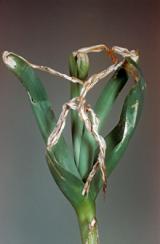|
Two New Pests enter the RHS Top Ten
 |
| Leek Moth copyright RHS.jpg |
|
Slugs and snails have taken the top RHS pest enquiry slot for 2011 after having been toppled from the first place by viburnum beetle in 2010. Usually they are the number one problem in most years with 2010 being a slight variation. Nearly all gardens suffer from slugs and snails and since they damage a wide range of plants it is not surprising that they often generate most enquiries.
This year’s RHS list has two pests that are in the top ten for the first time. Fuchsia gall mite, at number six, was unknown in the UK before 2007. It was discovered when a sample from a Hampshire garden was sent to the RHS Members’ Advisory Service for identification. Since then it has become widely established along the south coast and is moving northwards.
These microscopic mites are having a major impact on the growth of fuchsias. Their feeding at the shoot tips and in the flower buds causes severely distorted growth. Affected plants are unable to produce normal leaves and flowers.
RHS Principal Entomologist Andrew Halstead. “Unfortunately there are no effective pesticides for garden use. Because the damage cannot be controlled, it may lead to a decline in the popularity of this valuable garden plant.”
The other new entry, at number eight, is leek moth. Although mainly a problem on leeks, it also affects onions and shallots. The moth produces two generations of caterpillars during summer. The second generation in late July–August is particularly troublesome. The young caterpillars mine the leaves but later they bore into the stems of leeks and the bulbs of onions and shallots. Infested leeks often become infected with secondary rots and die.
Leek moth is mainly found in the south of England and South Wales but, like fuchsia gall mite, is also spreading northwards. Another pest affecting leeks and allied vegetables is allium leaf miner. This small fly was first discovered in the Wolverhampton area in 2003 and is now widespread in the Midlands and is also present in northeast Surrey.
Although there are no pesticides available, knowledge of these pests mean that garden centres can help to identify any problems that gardeners have, and offer the advice to grow the plants under mesh.
 |
|